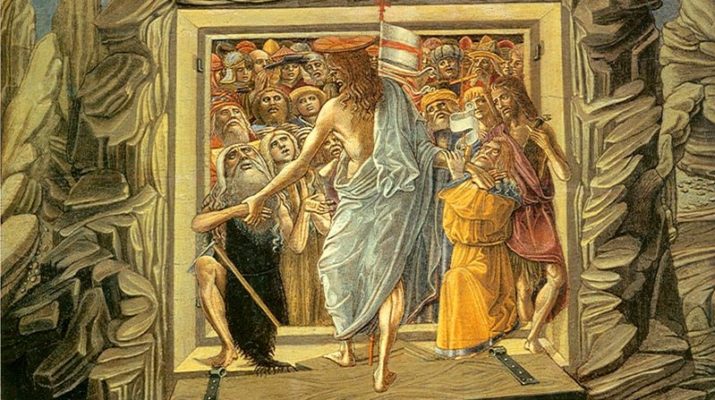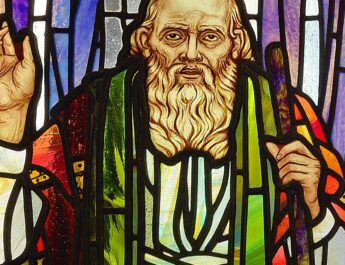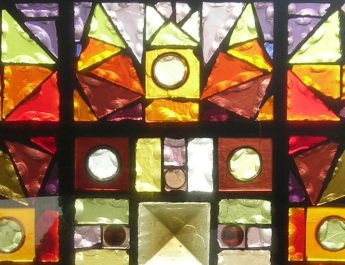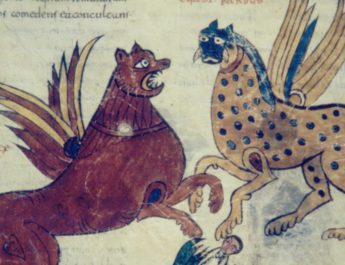1 Peter 3:18-22
Lent B13
18 For ChristA also sufferedB for sinsC once for all, the righteousD for the unrighteous,E in order to bring you to God.F
A “Christ” = Christos. From chrio (consecrate by anointing with oil; often done for prophets, priests, or kings). Literally, the anointed one, Christ. The Greek word for Messiah.
B “suffered” = pascho. Akin to penthos (mourning, sorrow). This is to be acted on for good or ill. It is often used for negative treatment. Properly, it means feeling strong emotions – especially suffering. It can also be the ability to feel suffering.
C “sins” = hamartia. From hamartano (to miss the mark, do wrong, make a mistake, sin); {from a (not) + meros (a part or share)}. Literally, this means not having one’s share or portion – like not receiving inheritance or what was allotted to you. This word means missing the mark so it is used for guilt, fault, and acts of sin.
D “righteous” = dikaios. From dike (the principle of justice; that which is right in a way that is very clear; a decision or the execution of that decision; originally, this word was for custom or usage; evolved to include the process of law, judicial hearing, execution of sentence, penalty, and even vengeance; more commonly, it refers to what is right); may be from deiknumi (to show, point out, exhibit; figurative for teach, demonstrate, make known). This is correct, righteous, just, or a righteous person. It implies innocent or conforming to God’s standard of justice.
E “unrighteous” = adikos. Related to “righteous” in v18. 12x in NT. From a (not, without) + dike (see note D above). This is unjust or wicked. It is one who violates God’s law. By implication, it refers to someone who is treacherous. It can also be used more broadly for someone of a different faith.
F “God” = theos. From Proto-Indo-European origins, meaning do, put, place. This is God or a god in general.
He was put to deathG, H in the flesh,I but made aliveJ in the spirit,K
G “put to death” = thanatoo. 11x in NT. From thanatos (death, whether literal or spiritual; also something fatal); from thnesko (to die, be dead). This is to kill in a literal or figurative sense – subdue, mortify, be apart from.
H {untranslated} = men. This is truly, indeed, even, in fact. Often, it is not translated, but used to emphasize affirmation.
I “flesh” = sarx. May be from saroo (to sweep, cleanse by sweeping); from sairo (to brush off). This is flesh, the body, human nature, materiality, kindred. Flesh is not always evil in scripture (as when it refers to Jesus taking on a human body). However, it is generally used in a negative way for actions made selfishly and not through faith. This can mean animal flesh, i.e. meat, or refer to body in contrast to soul/spirit. Flesh can be a way of talking about how things or people are related or talking about human frailty (physical or moral).
J “made alive” = zoopoieo. 11x in NT. From the same as zoon (literally a thing that is alive; so, an animal or living creature); {from zao (to live literally or figuratively)} + poieo (to make, do, construct, cause). This is to bring life to something, including something that was dead. This can also be to revitalize in a literal or figurative sense.
K “spirit” = pneuma. From pneo (to blow, breath, breathe hard). This is wind, breath, or ghost. A breeze or a blast or air, a breath. Figuratively used for a spirit, the human soul or part of us that is rational. It is also used supernaturally for angels, demons, God, and the Holy Spirit. This is where pneumonia comes from.
19 in which also he wentL and made a proclamationM to the spirits in prison,N
L “went” = poreuomai. From poros (ford, passageway). This is to go, travel, journey, or die. It refers to transporting things from one place to another and focuses on the personal significance of the destination.
M “made a proclamation” = kerusso. This is to proclaim, preach, publish. Properly, it is to act as a herald – announcing something publicly with confidence and/or to persuade.
N “prison” = phulake. From phulasso (to guard something so that it doesn’t escape – to watch over it vigilantly; being on guard in a literal or figurative sense); related to phulaks (military guard, sentry, watcher). This is the act of guarding, the person who guards, the place where guarding occurs (i.e. a prison), or the times of guarding (the various watches).
20 who in former times did not obey,O when God waitedP patientlyQ in the days of Noah,R
O “did not obey” = apeitheo. 14x in NT. From apeithes (unbelieving, disobedient, spiritually rebellious); {from a (not, without) + peitho (to have confidence, urge, be persuaded, agree, assure, believe, have confidence, trust)}. This is to disobey or rebel. It refers to those who refuse to be convinced of something – willful disbelief.
P “waited” = apekdechomai. 8x in NT. From apo (from, away from) + ekdechomai (to take or receive, expect, await; to welcome someone from your heart; focusing on the goal of waiting or the outcome); {from ek (from, from out of) + dechomai (to warmly receive, be ready for what is offered, take, accept, or welcome; to receive in a literal or figurative sense)}. This is eager awaiting or fully expecting something.
Q “patiently” = makrothumia. 14x in NT. From makros (long, long lasting) {from mekos (length); probably related to megas (great or large)} + thumos (passion, wrath; actions emerging from passion or impulse) {from thuo (to rush along, breathe violently, offer sacrifice)}. Properly, this is long-passion or long-suffering – one who waits the needed amount of time before expressing anger. This is also patience, perseverance, and fortitude.
R “Noah” = Noe. 8x in NT. From Hebrew nuach (to rest, calm, camp, free, place, remain, satisfy, settle, station, or wait; implies settling down in a literal or figurative sense). This is Noah, meaning rest.
during the buildingS of the ark,T in which a few, that is, eight persons,U were savedV through water.
S “building” = kataskeuazo. 11x in NT. From kata (down, against, among, throughout) + skeuazo (to prepare using a tool); {from skeuos (tool, container, property, goods)}. This is to prepare, build, or ordain. It denotes preparing with the use of tools and with skill.
T “ark” = kibotos. 6x in NT. This is a wooden box or chest. It also refers to Noah’s ark and the ark of the covenant.
U “persons” = psuche. From psucho (to breathe, blow). This is breath, the breath of life, the self, individual, soul. This is the word for that which makes a person unique – their identity, will, personality, affections. This isn’t the soul as the immortal part of us, but as our individuality. It is also not life as a general concept, but specific to people. This is where the words psyche and psychology come from.
V “saved” = diasozo. 8x in NT. From dia (through, across to the other side, thoroughly) + sozo (to save, heal, rescue); {from sos (safe, well, rescued)}. This is thoroughly saved or delivered from danger. It can also be to make someone entirely whole, to cure, or preserve.
21 And baptism,W which this prefigured,X now savesY you—not as a removal of dirtZ from the body,AA
W “baptism” = baptisma. From baptizo (to submerge, wash, or immerse; used specially for baptism); from bapto (to dip or dye; to entirely cover with liquid, to stain). This is dipping or sinking. Also, the rite of baptism.
X “prefigured” = antitupos. 2x in NT. From anti (opposite, instead of, against) + tupos (figure, model, image, impression, pattern, copy; properly, a model created through much repetition so figuratively the proper model; the impression of a stamped image, the mark of a scar, the shape of a statue; figuratively, it can refer to a style or resemblance; used specially for a model as something to imitate or as a cautionary tale); {from tupto (to strike repeatedly, wound, punish; figuratively to offend)}. This is corresponding to or typical if. It can refer to an image copy, counterpart, or figure. It can also be a predictive symbol.
Y “saves” = sozo. Related to “saved” in v20. See note V above.
Z “dirt” = rhupos. 1x in NT. This is filth, dirt, or grease. Figuratively, it can be depravity or an impurity resulting from immorality.
AA “body” = sarx. Same as “flesh” in v18. See note I above.
but as an appeal to God for a goodBB conscience,CC through the resurrectionDD of JesusEE Christ,
BB “good” = agathos. This is good, a benefit, or a good thing. It is good by its very nature, intrinsically good. A different word, kalos, refers to external signs of goodness.
CC “conscience” = suneidesis. From suneidon (to see together and so know, realize, consider, be conscious of); {from sun (with, together with) + eidon (shape, appearance, kind; something observable; form in a literal or figurative sense); from eido (to know, remember, perceive – to see and so understand)}. This is properly to know together. The conscience, found in all, is a moral and spiritual capacity granted by God so that we can understand together what is good and right.
DD “resurrection” = anastasis. From anistemi (to raise up, rise, appear; to stand up literally or figuratively. Can also mean to resurrect); from ana (upwards, up, again, back, anew) + histemi (to make to stand, place, set up, establish, appoint, stand by, stand still, stand ready, stand firm, be steadfast). This is literally standing up or standing again. It is used figuratively for recovering a spiritual truth. It can be raising up, rising, or resurrection.
EE “Jesus” = Iesous. From Hebrew Yehoshua (Joshua, the Lord is salvation); {from YHVH (proper name of the God of Israel; the self-existent and eternal one); {from havah (to become) or from hayah (to come to pass, become, be)} + yasha (to deliver, defend, help, preserve, rescue; properly, to be open, wide or free, which implies being safe. So, in a causative sense, this is to free someone)}. This is Jesus or Joshua in Greek – the Lord saves or the Lord is salvation.
22 who has gone into heavenFF and is at the right handGG of God, with angels,HH authorities,II and powersJJ made subjectKK to him.
FF “heaven” = ouranos. May be related to oros (mountain, hill) with the notion of height. This is the air, the sky, the atmosphere, and heaven. It is the sky that is visible and the spiritual heaven where God dwells. Heaven implies happiness, power, and eternity.
GG “right hand” = dexios. Perhaps related to “waited” in v20. Perhaps from dechomai (see note P above). This is right, right side, or the right hand.
HH “angels” = aggelos. Probably from ago (to lead, bring, carry, guide) + agele (flock, herd, drove); {also from ago (see above)}. This is angel or messenger. Properly, it is one sent with news or to perform a specific task. This messenger can be human or an angel from heaven. More commonly, it is used for angels in the New Testament.
II “authorities” = exousia. From exesti (to be permitted or lawful); {from ek (out, out of) + eimi (to be, exist)}. This is power to act or weight. It especially denotes moral authority or influence. It can mean domain, liberty, freedom, capacity, mastery, right, force, or strength.
JJ “powers” = dunamis. From dunamai (to be able, have power or ability). This is might, strength, physical power, efficacy, energy, and miraculous power. It is force literally or figuratively – the power of a miracle or the miracle itself.
KK “made subject” = hupotasso. From hupo (by, under, about, under one’s authority) + tasso (to arrange, appoint, determine). This is to place under. So it is to subject, submit, obey, or subordinate.
Image credit: “Desent into Limbo” by Benvenuto di Giovanni, 1491.




